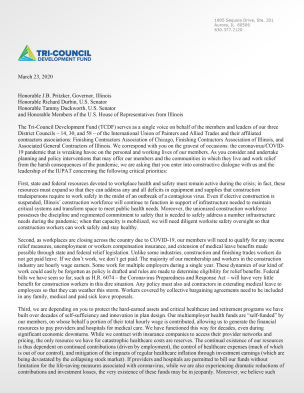The TCDF continues to use its collective voice and political influence to help secure protections for workers and financial relief for contractors struggling with the COVID-19 crisis. As the extent of the virus’ impact became clear, the TCDF opened communications with Governor Pritzker, members of Illinois’ congressional delegation, and members of the Illinois General Assembly. These ongoing communications have focused on four areas in which state and federal resources must be directed toward assistance for construction trades workers and contractors. These include
